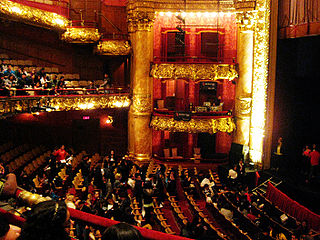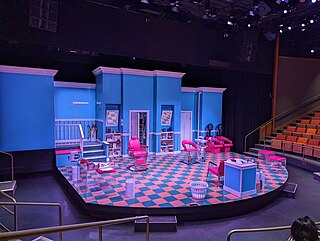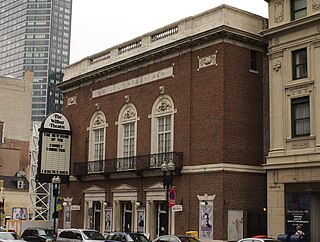
In American theater, summer stock theater is a theater that presents stage productions only in the summer. The name combines the season with the tradition of staging shows by a resident company, reusing stock scenery and costumes. Summer stock theaters frequently take advantage of seasonal weather by having their productions outdoors, under tents set up temporarily for their use, or in barns.

Harry Groener is a German-born American actor and dancer, perhaps best known for playing Mayor Wilkins in Buffy the Vampire Slayer.

The Colonial Theatre in Boston, Massachusetts, opened in 1900, is the oldest continually-operating theatre in the city. It is located at 106 Boylston Street on Boston Common at the former site of the Boston Public Library. It is a pending Boston Landmark.

Shear Madness is an interactive whodunit play, and is one of the longest-running nonmusical plays in the world. On January 29, 2020, the Boston cast celebrated its 40th anniversary at The Charles Playhouse Stage II. The show's Boston instantiation closed on March 15, 2020.
Robert Wierzel is an American lighting designer.

The Wilbur Theatre is a historic performing arts theater at 244–250 Tremont Street in Boston, Massachusetts. The Wilbur Theatre originally opened in 1914, but underwent renovations in 2008. The Wilbur Theatre sits in the heart of Boston's historic theater district and is known for hosting live comedy and music.
The American National Theatre and Academy (ANTA) is a non-profit theatre producer and training organization that was established in 1935 to be the official United States national theatre that would be an alternative to the for-profit Broadway houses of the day.

The Hollis Street Theatre (1885–1935) was a theatre in Boston, Massachusetts, that presented dramatic plays, opera, musical concerts, and other entertainments.
David Findley Wheeler was an American theatrical director. He was the founder and artistic director of the Theater Company of Boston (TCB) from 1963 to 1975. He served as its artistic director until its closure in 1975. Actors including Al Pacino, Robert De Niro, Dustin Hoffman, Robert Duvall, Jon Voight, Stockard Channing, James Woods, Blythe Danner, Larry Bryggman, John Cazale, Hector Elizondo, Spalding Gray, Paul Guilfoyle, Ralph Waite and Paul Benedict were part of the company.
The Actor's Workshop was a theatre company founded in San Francisco in 1952. It was the first professional theatre on the west coast to premiere many of the modern American classics such as Arthur Miller's Death of a Salesman and The Crucible, and the world dramas of Samuel Beckett, Bertolt Brecht, Jean Genet and Harold Pinter. For the 1953–1954 season, the Workshop offered six plays: Lysistrata, by Aristophanes; Venus Observed, by Christopher Fry; Death of a Salesman, by Arthur Miller; a revival of Playboy; The Cherry Orchard, by Anton Chekhov; and Tonight at 8.30, by Noël Coward. On April 15, 1955, the Actor's Workshop signed the first Off-Broadway Equity contract to be awarded outside New York City.

Theater in Pittsburgh has existed professionally since the early 1800s and has continued to expand, having emerged as an important cultural force in the city over the past several decades.

The Park Theatre (est.1879) was a playhouse in Boston, Massachusetts, in the late 19th and early 20th centuries. It later became the State cinema. Located on Washington Street, near Boylston Street, the building existed until 1990.
The National Theatre (1911-1978) of Boston, Massachusetts, was a 3,500-seat multipurpose auditorium on Tremont Street in the South End. It functioned as a cinema, lecture hall, and stage. Performers included Jehovah's Witness founder Joseph F. Rutherford and "big-name entertainers like Duke Ellington and Ray Bolger." Movie screenings included The Battle of Gettysburg in 1913. The English High School held graduation exercises in the National. Around 1919 it was known as the "Waldorf Theater." In 1992, it was purchased by Philip Smith.
The St. James Theatre (1912–1929) of Boston, Massachusetts, was a playhouse and cinema in the Back Bay in the 1910s and 1920s. It occupied the former Chickering Hall on Huntington Avenue near Massachusetts Avenue, adjacent to Horticultural Hall. For some years Loew's theatre chain oversaw the St. James. In 1929 the theatre "became part of the Publix (Paramount) chain, and was renamed the Uptown."
The Gaiety Theatre (1908–1949) or Gayety Theatre of Boston, Massachusetts, was located at no.661 Washington Street near Boylston Street in today's Boston Theater District. It featured burlesque, vaudeville and cinema. Performers included Clark and McCullough, Solly Ward, and Lena Daley; producers included Charles H. Waldron, Earl Carroll, and E.M. Loew. In 1949 it became the "Publix Theatre." The building existed until its razing in 2005.
Michael Murray is an American stage director, producer and educator. He is one of the early leaders of the Regional Theatre Movement. Murray was co-founder of the Charles Playhouse in Boston, MA. and served as its Artistic Director for eleven years (1957–1968). Murray was the Artistic Director of the Cincinnati Playhouse in the Park (1975–1985). In addition, he directed productions Off-Broadway in New York and at many regional theaters, including the Hartford Stage Company, Center Stage Baltimore, the Philadelphia Drama Guild, and the Huntington Theatre Company. He held the position of Chair of the Theatre Arts Department of Brandeis University (1986–2003).

The Boston Theater District is the center of Boston's theater scene. Many of its theaters are on Washington Street, Tremont Street, Boylston Street, and Huntington Avenue.
Southland was a ballroom/cafe on Warrenton Street in Boston, in the United States, in what is now the Charles Playhouse. Originally a church, converted into a club, is best known for featuring prominent jazz artists of the 1930s and 1940s such as Count Basie, Duke Ellington, Cab Calloway, Jimmie Lunceford, and many others. Southland was connected to the radio and it became a notable venue for broadcasting jazz over the radio in the 1940s. On 19 February 1940, Count Basie and his Orchestra opened a four-week engagement at Southland which was broadcast on 20 February. Southland's entertainment also featured dancers such as Rubberlegs Williams, who also sang with Basie on numerous occasions.
Braddock Hotel was a hotel at the corner of 126th Street and 8th Avenue in New York City, near the Apollo Theater. The hotel bar was popular with black jazz musicians, and Dizzy Gillespie, Billy Eckstine, Billie Holiday, Ella Fitzgerald and Dinah Washington performed here. Before he joined the Nation of Islam, Malcolm X often spent time at the hotel's bar.











